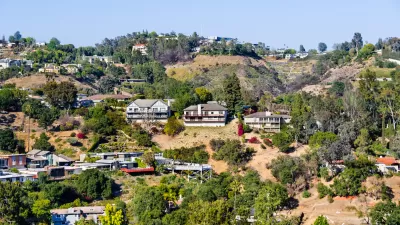A new report documents the rise of payments in lieu of taxes (PILOTs) made by non-profits to cities desperate for new revenue. Although they've gained notice by cash-strapped cities, the report indicates PILOTs typically generate little revenue.
As we noted previously, the use of PILOTs to help fill city coffers is on the rise across America. A new report published by the Lincoln Institute of Land Policy, "Payments in Lieu of Taxes by Nonprofits: Which Nonprofits Make PILOTs and Which Localities Receive Them", and authored by Daphne A. Kenyon, Adam H. Langley and Patricia C. Bailin, "provides far more detail on these voluntary payments than was previously available in any single source."
"Although many more municipalities are considering PILOTs," notes the Lincoln Institute, "the report
provides a reality-check for anyone expecting them to be a panacea for
cash-strapped cities and towns. For the typical locality receiving
PILOTs, these voluntary payments account for only 0.13 percent of
general revenue. That's the same amount that local governments raise
from charges for parking meters and parking lots."
"Sometimes the
debate surrounding PILOTs can seem a lot bigger than the dollars
involved," said Adam H. Langley. "PILOTs simply don't generate enough
revenue to be a panacea for cash strapped cities and towns, and concerns
that these payments will seriously undermine nonprofits' financial
health seem exaggerated since these payments are voluntary-nonprofits
can say ‘no'-and are typically much less than what nonprofits would pay
if taxable."
FULL STORY: Top cash-strapped cities turning to PILOTs

Alabama: Trump Terminates Settlements for Black Communities Harmed By Raw Sewage
Trump deemed the landmark civil rights agreement “illegal DEI and environmental justice policy.”

Study: Maui’s Plan to Convert Vacation Rentals to Long-Term Housing Could Cause Nearly $1 Billion Economic Loss
The plan would reduce visitor accommodation by 25% resulting in 1,900 jobs lost.

Planetizen Federal Action Tracker
A weekly monitor of how Trump’s orders and actions are impacting planners and planning in America.

Waymo Gets Permission to Map SF’s Market Street
If allowed to operate on the traffic-restricted street, Waymo’s autonomous taxis would have a leg up over ride-hailing competitors — and counter the city’s efforts to grow bike and pedestrian on the thoroughfare.

Parklet Symposium Highlights the Success of Shared Spaces
Parklets got a boost during the Covid-19 pandemic, when the concept was translated to outdoor dining programs that offered restaurants a lifeline during the shutdown.

Federal Homelessness Agency Places Entire Staff on Leave
The U.S. Interagency Council on Homelessness is the only federal agency dedicated to preventing and ending homelessness.
Urban Design for Planners 1: Software Tools
This six-course series explores essential urban design concepts using open source software and equips planners with the tools they need to participate fully in the urban design process.
Planning for Universal Design
Learn the tools for implementing Universal Design in planning regulations.
Caltrans
Smith Gee Studio
Institute for Housing and Urban Development Studies (IHS)
City of Grandview
Harvard GSD Executive Education
Toledo-Lucas County Plan Commissions
Salt Lake City
NYU Wagner Graduate School of Public Service



























